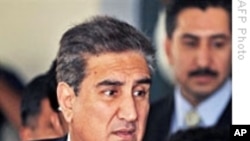The Obama administration and Congressional leaders reiterated Tuesday that a planned long-term U.S. civilian aid program for Pakistan would not impinge on that country's sovereignty. Pakistani Foreign Minister Shah Mehmood Qureshi paid his second visit to Washington in as many weeks Tuesday to discuss terms of the aid legislation, which have set off a political controversy in Islamabad.
Both administration officials and Congressional leaders say the terms of the aid plan are not out of the ordinary, and that they hope Senate clarifications to be given to the Pakistani foreign minister will ease the political furor in Islamabad.
The package under which Pakistan is to get $1.5 billion in U.S. non-military aid in each of the next five years was hailed by both governments when it was overwhelmingly approved by the House and Senate last month.
But some Pakistani political factions and the country's powerful military have been bitterly critical of provisions in the legislation which, among other things, requires the Obama administration to report to Congress every six months on whether Pakistan's newly-democratic government is exercising effective civilian control over the military.
It also says Pakistan must show progress in ending support for terrorist groups and dismantling radical factions based on its soil.
At the strong urging of the Pakistani military, Foreign Minister Qureshi was sent back to Washington, where he had been only a week ago, to raise concerns over the bill's language with Congress and the administration.
Democrat Senate Foreign Relations Committee Chairman John Kerry said after meeting the Pakistani envoy that the legislation does not need to be changed but that Qureshi would get written clarifications of terms of the measure he said have been inaccurately characterized by some quarters in Pakistan.
There were similar comments from Assistant Secretary of State for Public Affairs P.J. Crowley, who joined Kerry in denying the bill would impinge on Pakistan's sovereignty.
"We recognize that there have been questions raised in the political debate in Pakistan. Obviously we think that debate is healthy. We're going to help the foreign minister answer the questions that have been raised in this debate. We do not think the bill in any way impinges on Pakistani sovereignty. There are strict measures of financial accountability, but the Congress has imposed those on the U.S. executive branch," he said.
The authorization bill was framed as an effort to regularize a U.S. civilian aid program which has fluctuated over the years depending on regional events. It would be in addition to a military aid program for Pakistan which has averaged about $1 billion a year since 2001.
Senator Kerry said the package is intended to be a true sign of friendship for Pakistan, while spokesman Crowley said it creates balance in the U.S. aid program and that it is hard to see how that impedes Pakistan's military. "From our standpoint the bill is a very important step forward in terms of balancing the types of assistance that we would provide the Pakistan government - supporting consolidation of democratic institutions, expanding the rule of law, building the capacity of government institutions, promoting respect for internationally-recognized human rights, promoting economic freedoms, sustainable economic development. This is the support that we believe is right for Pakistan and right for much of the world," he said.
In addition to Senator Kerry, Foreign Minister Qureshi met with U.S. special representative for Pakistan and Afghanistan Richard Holbrooke and White House National Security Adviser James Jones.
White House spokesman Robert Gibbs, who said he thinks opponents of the measure are misinformed or misinterpreting it for political reasons, said he expects President Obama to sign it into law soon.
Separate appropriations legislation will be needed before actual delivery of the funds.




